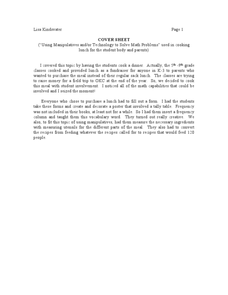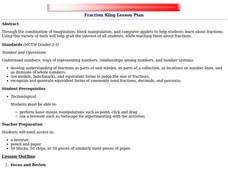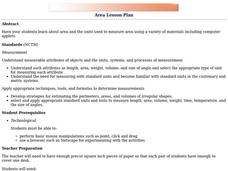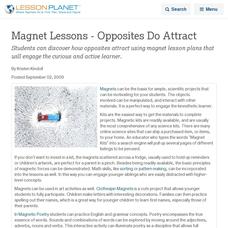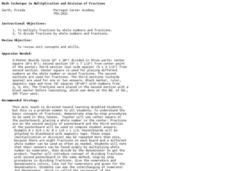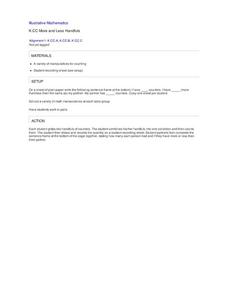CK-12 Foundation
Solving Problems by Factoring: Building a Doghouse
Building a doghouse is easier with a little mathematical help! Young scholars use sliders to adjust the length of the doghouse and watch as it affects the width and area. They then answer questions that help them discover the question...
Mathalicious
Pandemic
Young scientists use exponential growth and logarithms to model how a virus spreads through a population. Pupils watch a news clip about the 2012 outbreak of Ebola. Scholars then manipulate inactive graphs to see how various factors...
Curated OER
Help Young Mathematicians Write Their Way to Math Success
Clear and concise writing should be an integral part of learning mathematics.
Curated OER
Adding Mixed Numbers - Unequal Denominators
Working with fractions that have unequal denominators is one of the most difficult concepts for young mathematicians to master. Here you will find a fine lesson that should help youngsters begin to get a grasp on this important...
Curated OER
Subtracting Fractions - Unequal Denominators
Subtracting fractions that have unequal denominators is a tricky process. The instructional activity utilizes fraction bars as a manipulative, in order to understand subtracting fractions and estimating differences. After completing...
Curated OER
Hands-On Equations
Use this worksheet with the Hands-On Equations kit of manipulatives. Learners find the value of x in 5 equations, then check their answers. A great addition to your math lesson!
Curated OER
"Using Manipulatives and/or Technology to Solve Math Problems" by Cooking Dinner
Students explore math functions by preparing a meal. In this food measurement lesson, students examine a recipe for a meal and alter the size of the recipe based upon the amount of servings needed. Students utilize manipulatives to...
Curated OER
Manipulating Multi-step Equations (Grade 8)
Ninth graders solve multi-step equations. In this Algebra I lesson plan, watch a video on solving equations with variables on both sides of the equal sign. Students visit an Internet site to solve simple equations through the use of a...
Curated OER
Fraction King Lesson Plan
Pupils examine the concept of fractions. In this fractions king lesson, students review math vocabulary and discover the equivalent forms of fractions as decimals and percents.
Curated OER
Counting and Math Concepts
Students practice counting to the number three. In this number sense lesson, students practice counting to the number three by using various objects. Students arrange and count the objects.
Curated OER
Angles Lesson Plan
Students explore the relationship of angles as it relates to 2 and 3-D shapes. In this geometry lesson, students differentiate between acute, obtuse, right, alternate interior, exterior and adjacent angles. They manipulate a math program...
Curated OER
Working With Pattern Blocks
Fifth graders solve mathematical problems using manipulatives in this math lesson for the fifth grade classroom. Various activities are suggested for lesson implementation making this lesson highly adaptable to fit the needs of the...
Curated OER
Multiplication Lesson Plan
Students roll dice to come up with 1 digit numbers that they multiply together. In this multiplication lesson plan, students arrange piles of blocks and count them to complete problems.
Curated OER
Multiplication Lesson
Fourth graders use grid paper, M&M's, and vocabulary words, to correctly complete multiplication problems. In this multiplication lesson plan, 4th graders complete number sentences, use symbols, solve equations, and more.
Curated OER
Painted Cube Lesson
Students differentiate between cubes and unit cubes. In this geometry lesson, students create linking cubes and use it as a manipulative to answer questions. They define the faces, edges and sides of the cubes as it relates to unit cubes.
Curated OER
Area Lesson Plan
Learners explore geometry by using computer applications. In this spatial measurement instructional activity, students discuss the difference between area, weight, volume and other forms of measurement. Learners utilize computer...
Curated OER
Which Fraction is Bigger or Smaller?
Compare fractions with common numerators! Pupils look at fractions with different denominators and the same numerator to find which one is bigger. They look at hands-on manipulations of fractions to understand the concept of why one is...
Curated OER
Add It Up
First graders engage in a lesson plan that gives the research basis for the use of manipulatives for the basic operations in mathematics. They use the variety of tools to solve basic problems. The lesson plan has valuable resource links...
Curated OER
Magnet Lessons - Opposites Do Attract
Students can discover how opposites attract using magnet lesson plans that will engage the curious and active learner.
Curated OER
Math Technique in Multiplication and Division of Fractions
Students multiply and divide fractions. For this math lesson, students are given explicit visual instruction of how to work with fractions. Intended for learning disabled students, the teacher demonstrates how to manipulate the numbers...
Curated OER
Solving Equations Using Models
Explore mathematics by analyzing images. As they view pictures on the SMART Board, individuals must write corresponding algebraic equations. They utilize models to visualize the math expressions.
Montana Office of Public Instruction
Native American Culture: Counting, 1:1 Correspondence
Kindergarteners practice showing 1:1 correspondence while incorporating information they learned about a local Native American culture. The objects used for counting are taken from the previous day's Native American lesson plan. The...
Curated OER
Similarity and Dilations - Discover Properties of Similar Figures
Learners investigate properties of similar figures. In this properties of similar figures activity, pupils construct similar figures using Cabri Jr. They dilate their figure to create a similar one, and discuss the relationships between...
Curated OER
More and Less Handfuls
Working as a pair, two kindergartners will sit at a table and will pick two handfuls of counters. They will combine their individual handfuls into one, and count their own selection. They will then draw and record their count on a record...








